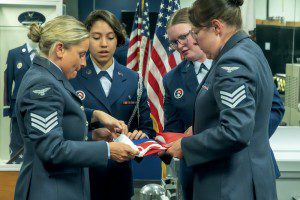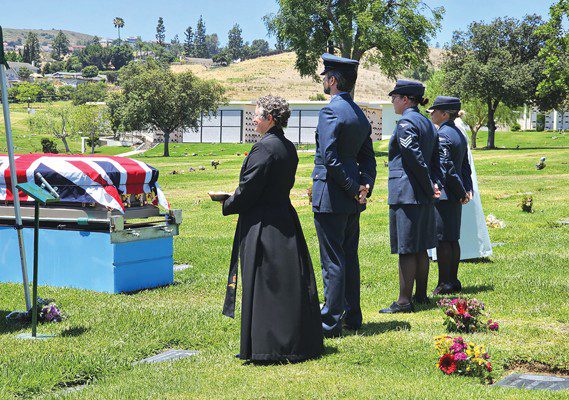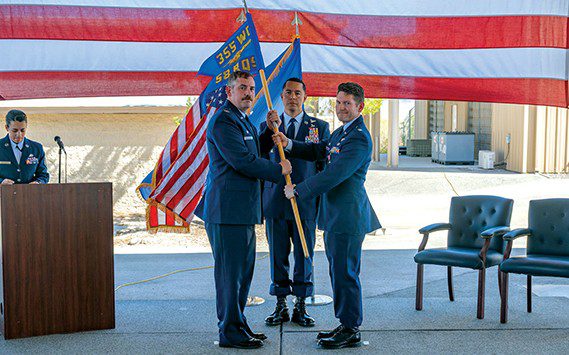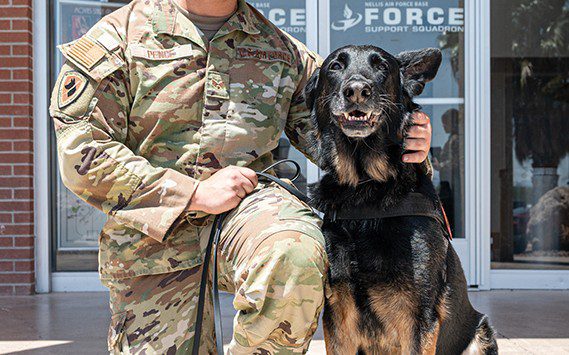The Blue Eagles Honor Guard at Edwards Air Force Base, Calif., provided a first-of-its-kind support to a British World War II Allied Veteran who had recently passed away.
The Blue Eagles trained two members of the Royal Air Force to properly conduct a flag-folding ceremony in honor of Stella Brecht, who had served as a radar technician and mechanic in the RAF Women’s Auxiliary Air Force during World War II.
“I studied the British regulations on flag folding and obtained a recording of the British version of Taps, the ‘Last Post.’ to understand the similarities and differences. The flag folding is almost identical, except it is done in the opposite direction,” said Tech. Sgt. Derek Day, who manages the Edward’s Blue Eagles Honor Guard program.
Brecht resided in Whittier, Calif., about 100 miles south of Edwards, the current home of the Royal Air Force’s No. 17 Test and Evaluation Squadron. Stars seemed to align, and the family’s request was able to be fulfilled.
Senior Airman Kendall Waterfield and Airman 1st Class Nathalia Batista da Silva, from Edward’s Blue Eagles Honor Guard, trained Sgt. Karina Fernandez and Sgt. Rachel Douglas, from the Royal Air Force, on flag folding techniques.
“It was a great opportunity and real privilege to work with our allies,” said Batista da Silva.

They met the family at the Queen of Heaven Cemetery & Mortuary in Rowland Heights, California, and helped honor Brecht and lay her to rest. Reverend (Squadron Leader) Alice McDermott, British Forces Chaplain (USA) and Warrant Officer Engineering Anthony Fisher, Royal Navy were also in attendance.
“As a female Royal Air Force chaplain, it was a privilege to be involved in honoring our veteran, Stella, despite her funeral being far from the UK where she served her King and country during WWII,” said McDermott.
Brecht was born and raised in England and was only 15 years old when WWII commenced. She worked at a manufacturing plant’s chemistry laboratory, strengthening aluminum for combat aircraft. At the age of 17, she joined the Women’s Auxiliary Air Force, a branch of the British Royal Air Force, as a radar technician and mechanic. She was working in an underground bunker on D-Day, June 6, 1944, when the Allied Forces – American, British, Canadian and French – invaded Normandy to fight against the Nazi occupation. Signals from the aircrafts flying overhead overloaded her radars.
Brecht married a U.S. Army Air Corps soldier stationed in England and together had a son. When the war was over, they sailed across the Atlantic Ocean to the United States on the Queen Mary and settled in Fresno, California.
“As a female officer in the RAF, I am always grateful for those that were in the WAAF, who marked the beginnings of our journey, especially because they did so at such a challenging time. I am pleased we have managed provide RAF representation at the funeral, it is important that we mark and celebrate the lives of those who served in the RAF,” wrote Air Commodore Nikki Thomas, OBE Air and Space Attaché, British Defence Staff at the British Embassy, wrote in a condolence letter to Brecht’s daughter.












